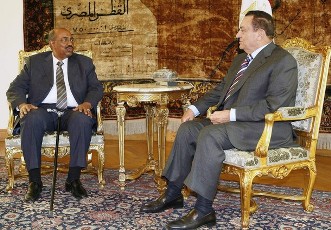Egypt says Bashir’s regime “worst in Sudan’s history”
December 29, 2010 (KHARTOUM) – The Sudanese government led by president Omer Hassan Al-Bashir is the “worst” in the country’s history, a leading figure at Egypt’s ruling National Democratic Party (NDP) said.

He made these remarks during the banquet of the Egyptian Council for Foreign Affairs’ annual conference yesterday, Al-Ahram reported.
El-Fiqy said that he is “extremely sorry that matters have reached the point they have in Sudan, where the very term referendum only appeared during this regime, and its expected result is separation, which will be met with separation in other parts, from Darfur to the east to Kordofan”.
“Egypt is the only country that will pay the price of what happens in Sudan from separation threats, the damage to it will be more so than to Northern Sudan,” he added.
The former adviser to Egyptian president Hosni Mubarak said it is fortunate that Cairo’s relations with Southern Sudan “are not bad”.
“God inspired us wisdom and we did not take part in the [North’s] war against the South in spite of provocation by the North to us” El-Fiqy said.
The strong statements of the Egyptian official come at the heels of rare criticism made by the semi-official Al-Ahram newspaper last week to Bashir for policies which it said lead to the South wanting to break away from the rest of the country.
Egyptian officials in the past have shyly blamed Bashir’s NCP party for the likely split of Sudan. Last February, Egyptian president reportedly criticized Khartoum for lacking the will to preserve the unity.
This month a senior Libyan official shared same sentiments and said that the North failed to make the unity attractive to the South.
“Our brothers in Khartoum have a responsibility to bear, this responsibility is represented in actions such as Shari’a law, the civilization project of [Hassan] Al-Turabi, the fighting and the declaration of Jihad on the south” Abdel Rahman Shalgam, Libya’s permanent representative to the United Nations, said in an interview with the UAE-based Al-Bayan newspaper.
El-Fiqy warned of the potential threats to Egyptian national security caused by Sudan’s breakup saying that “Israel will have a presence on our southern border”.
“Leaders from the North came to solve the situation with us in Egypt…..after this split we told them that we won’t reconcile with you when you’ve brought Israel to our southern border.”
“The previous head of Israeli military intelligence admitted that Israel supervised the training of the Southern military,” El-Fiqi said, adding that Israel has “units” there.
He further pointed out that South Sudan leader Salva Kiir announced that he will open an Israeli embassy in the new state.
However, Kiir denied the reports on the embassy in an interview with the London-based Al-Sharq Al-Awsat.
The referendum on independence for south Sudan was promised in the 2005 peace accord that ended a civil war between the mainly Muslim north and the south, where most follow traditional beliefs and Christianity.
A successful referendum could bring a conclusion to one of Africa’s most bitter conflicts, which has rumbled on since around the time of Sudan’s independence in the 1950s.
A leaked U.S. embassy cable released by Wikileaks showed an Egyptian request to Washington to help postpone the referendum by four to six years.
Egypt stressed to the U.S. that the creation of “a non-viable state” could threaten Egypt’s access to the Nile a time when several countries are negotiating how to share the river’s water. Several Nile basin countries have collaborated seeking a change to the colonial era treaty which guarantees that Egypt receives most of the Nile water.
Egypt and Sudan are refusing to sign up to a new agreement.
(ST)
